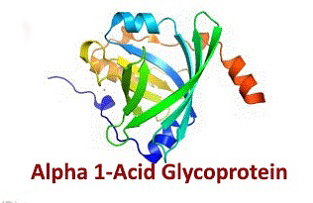COVID-19 News: Brazilian Study Finds That Alpha 1-Acid Glycoprotein Plays A Role In COVID-19 Severity!
Nikhil Prasad Fact checked by:Thailand Medical News Team Feb 01, 2024 1 year, 2 months, 2 weeks, 19 hours, 34 minutes ago
COVID-19 News: As the global pandemic of coronavirus disease 2019 (COVID-19) continues, researchers around the world are tirelessly working to understand the intricate mechanisms of the severe acute respiratory syndrome coronavirus 2 (SARS-CoV-2) and its impact on the human body. In a groundbreaking study tat is covered in this
COVID-19 News report, conducted at the Ribeirão Preto Medical School, University of São Paulo, Brazil, scientists have shed light on the role of alpha-1 acid glycoprotein (AGP) in severe cases of COVID-19.
 Alpha 1-Acid Glycoprotein Plays A Role In COVID-19 Severity
Understanding COVID-19 Severity
Alpha 1-Acid Glycoprotein Plays A Role In COVID-19 Severity
Understanding COVID-19 Severity
COVID-19 has proven fatal in approximately 1-2% of patients, primarily due to complications such as acute respiratory distress syndrome (ARDS), multi-organ failure, and vascular thrombosis, reminiscent of sepsis. Neutrophils, circulating white blood cells, have emerged as key players in assessing the severity of respiratory symptoms and outcomes in COVID-19. These first-line defenders combat microorganisms through oxidative stress, phagocytosis, and the release of neutrophil extracellular traps (NETs).
NETs, recently proposed as an innate immune response mechanism, serve as a double-edged sword in COVID-19. While they aim to localize and eliminate pathogens, their upregulation in COVID-19 patients has been associated with detrimental effects, promoting lung epithelial cell death. Recognizing the need for effective strategies to control infection, researchers have turned their attention to acute-phase reaction proteins (APRPs), including C-reactive protein (CRP) and serum amyloid A (SAA), which play vital roles in suppressing inflammation and regulating immunity.
The Enigma of Alpha 1-Acid Glycoprotein
One of the less-explored APRPs, alpha-1 acid glycoprotein (AGP), also known as orosomucoid (ORM), has been recognized as a major acute-phase protein produced in the liver in response to systemic injury and inflammation. AGP has immunomodulatory effects, notably inhibiting neutrophil migration in cases of sepsis. However, its role in COVID-19 remains elusive.
Hypothesis and Study Design
The researchers hypothesized that AGP is upregulated in severe COVID-19 patients and plays a crucial role in regulating NETosis - the release of NETs by neutrophils. To investigate this hypothesis, the study included 56 COVID-19 patients admitted to the Intensive Care Unit (ICU) between October 2020 and March 2021, confirmed through RT-PCR. A control group of 12 healthy subjects with no history of COVID-19 or acute inflammatory disease was also included.
Key Findings
The demographic and clinical data of the COVID-19 patients revealed a diverse population, with the majority being white (60.71%) and a prevalence of comorbidities such as systemic arterial hypertension, diabetes mellitus, and obesity.
Analyzing blood samples, the researchers discovered elevated levels of AGP in severe COVID-19 patients, with a significant positive co
rrelation with IL-6 and CRP, and a negative correlation with lactate levels. AGP treatment in vitro resulted in an upregulation of IL-6 production and a remarkable downregulation of early and late NETosis in neutrophils infected with SARS-CoV-2.
Implications and Future Research
These findings provide crucial insights into the immune response mechanisms in severe COVID-19 cases. The upregulation of AGP appears to be associated with the regulation of NETosis and increased IL-6 production, potentially contributing to the cytokine storm observed in COVID-19.
As the first study to demonstrate increased acute-phase protein levels in severe COVID-19 patients and their impact on NETosis, this research opens avenues for further exploration. Future studies could delve deeper into the specific mechanisms through which AGP modulates the immune response, potentially leading to the development of targeted therapeutic interventions.
Conclusion
In the relentless pursuit of understanding COVID-19, the Brazilian study conducted at the Ribeirão Preto Medical School has unveiled a previously overlooked player in the immune response - alpha-1 acid glycoprotein. The upregulation of AGP in severe COVID-19 patients and its role in regulating NETosis and IL-6 production bring us one step closer to deciphering the complex interplay between the virus and the human immune system. As research continues, these findings may pave the way for innovative therapeutic strategies to combat severe COVID-19 and mitigate its devastating effects on patients worldwide.
The study findings were published in the peer reviewed journal: Cytokine.
https://www.sciencedirect.com/science/article/abs/pii/S1043466624000061
For the latest
COVID-19 News, keep on logging to Thailand Medical News.
